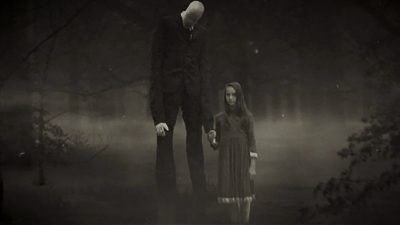
It’s no secret that the internet has a huge effect on people’s daily lives. The internet’s rabbit hole-esque format gives users the chance to become deeply invested within the barracks of the internet’s darkness, seeking solace in the many niches available on websites like Tumblr, 4chan and, in the Slender Man’s case, Creepypasta Wiki.
HBO’s new documentary, “Beware the Slenderman,” follows the true story of the 2014 Slender Man stabbing and considers the issues created through the immediacy of the internet. It tells the story of two twelve-year-old girls, Morgan Geyser and Anissa Weier, who made national headlines three years ago for leading a classmate into the forest and stabbing her 19 times. Their reason? A sadistic internet character named the Slender Man wanted them to.
By following these young girls, “Beware the Slenderman” analyzes the rough edges of the internet, asking a variety of questions regarding morality. Did the girls know what they were doing, or is the internet at fault? Where is the line drawn between the internet’s fictions and real life? It is undeniable that the girls’ actions were reprehensible, but if one went back to a time before internet culture, would the same type of crime have been committed?
The documentary finds itself seesawing between such arguments, but it does gravitate toward the idea that the Slender Man’s rise is directly correlated with a generational divide between parents and their millennial children.
It is with this sentiment that the documentary paints the ignorance of an older generation in a new age. There are countless times within the documentary when the parents of both Morgan and Anissa are shown speaking in defense of themselves and their methods of modern-age parenting.
In one moment, Morgan’s mother states that she assumed the Slender Man was an innocuous version of an age-old trope — kids and their obsession with old horror classics. She assumed Morgan was just being a kid, as she had been, when she read Stephen King’s “It” as a child.
Anissa’s father, in a similarly out-of-touch sentiment, shares that he did not think his daughter had the ability to know about such dark material because he made certain of time-based rules for his daughter’s iPad.
These anecdotes paint the parents as tragic figures completely unaware of their children’s plugged-in reality. The absence of knowledge over not just the Slender Man, but the dangers of the internet in general, shows the divide between parents and their children. Such a lack of communication between generations creates a world wherein the Slender Man is able to successfully capture young minds.
To Morgan and Anissa, the Slender Man’s colossal, faceless body was realistic and threatening enough to prompt vicious brutality against their friend. Once their fear overtook them, Morgan and Anissa had very little chance in separating the internet from reality.
However, it is also unfair to put blame solely on Morgan and Anissa’s parents for their unawareness, for how were they supposed to know their kids would believe in such folklore? It would be an oversimplification of the attempted murder to say this documentary is only based on the technological divide between parent and child. At the end of the day, although young, these girls still did have a choice. It is with this exact idea of choice and the nature of responsibility that “Beware the Slenderman” becomes a worthy documentary.
In an age that true crime documentaries popping up like wildfire, “Beware the Slenderman” finds itself comfortably placed in its chosen true crime genre. Sure, the documentary is full of some thematic contradictions regarding the morality of parenting, bullying and the dark power of the internet, but it also shines in its intimate portrayal of two sick-minded adolescents with little cognitive dissonance between fact and fiction.
“Beware the Slenderman” explains the disassociation that occurs between those raised on the internet, and those that were not. As Morgan’s mother states as she solemnly reflects on her daughter’s crimes, “It’s hard with kids because they don’t necessarily know how to differentiate between fantasy and reality.”




I would hope that in the future, minorities, specially African Americans are given the same level of compassion when dealing with crimes committed by minors. Unfortunately minorities are quickly labeled immoral and criminal. It is hard to see justice as fair when you see this discrepancy in the puplic perception of who is evil and who is mentally ill.